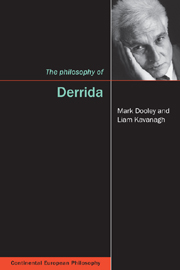Book contents
- Frontmatter
- Contents
- Preface
- Abbreviations
- 1 The catastrophe of memory: identity and mourning
- 2 Death and différance: philosophy and language
- 3 Repetition and post cards: psychoanalysis and phenomenology
- 4 The risks of negotiation: ethics and politics
- Afterword
- Notes
- Suggestions for further reading
- References
- Index
Afterword
- Frontmatter
- Contents
- Preface
- Abbreviations
- 1 The catastrophe of memory: identity and mourning
- 2 Death and différance: philosophy and language
- 3 Repetition and post cards: psychoanalysis and phenomenology
- 4 The risks of negotiation: ethics and politics
- Afterword
- Notes
- Suggestions for further reading
- References
- Index
Summary
Jacques Derrida died on 8 October 2004. What, in the end, is his legacy to the history of ideas? There are those, many eminent philosophers among them, who believe that Derrida was a charlatan undeserving of his fame and importance. One such person is English philosopher Roger Scruton. In his book Modern Culture (2005), Scruton argues that Derrida's deconstruction has become:
… the pillar of the new establishment, and the badge of conformity that the literary apparatchik must now wear. But in this it is no different from other subversive doctrines: Marxism, for example, Leninism and Maoism. Just as pop is rapidly becoming the official culture of the post-modern State, so is the culture of repudiation becoming the official culture of the post-modern university.
(Scruton 2005: 138)We are not unsympathetic to Scruton's analysis, for we believe Derrida's postmodern literary disciples have done untold damage to standards right across the academy. What makes their influence so pernicious is that they have misused Derrida's work in an attempt to strike at Western culture. The postmodern elite thinks that deconstruction amounts to an inversion of traditional hierarchies for its own sake. Thus, in their schema, everything white, Western, male and religious is bad. That has led to a belief among students that the great Western literary canon ought to be repudiated, because those who sought to oppress the wretched of the earth produced it.
- Type
- Chapter
- Information
- The Philosophy of Derrida , pp. 149 - 152Publisher: Acumen PublishingPrint publication year: 2006
- 1
- Cited by



